
The Business of Fashion
Agenda-setting intelligence, analysis and advice for the global fashion community.

Agenda-setting intelligence, analysis and advice for the global fashion community.
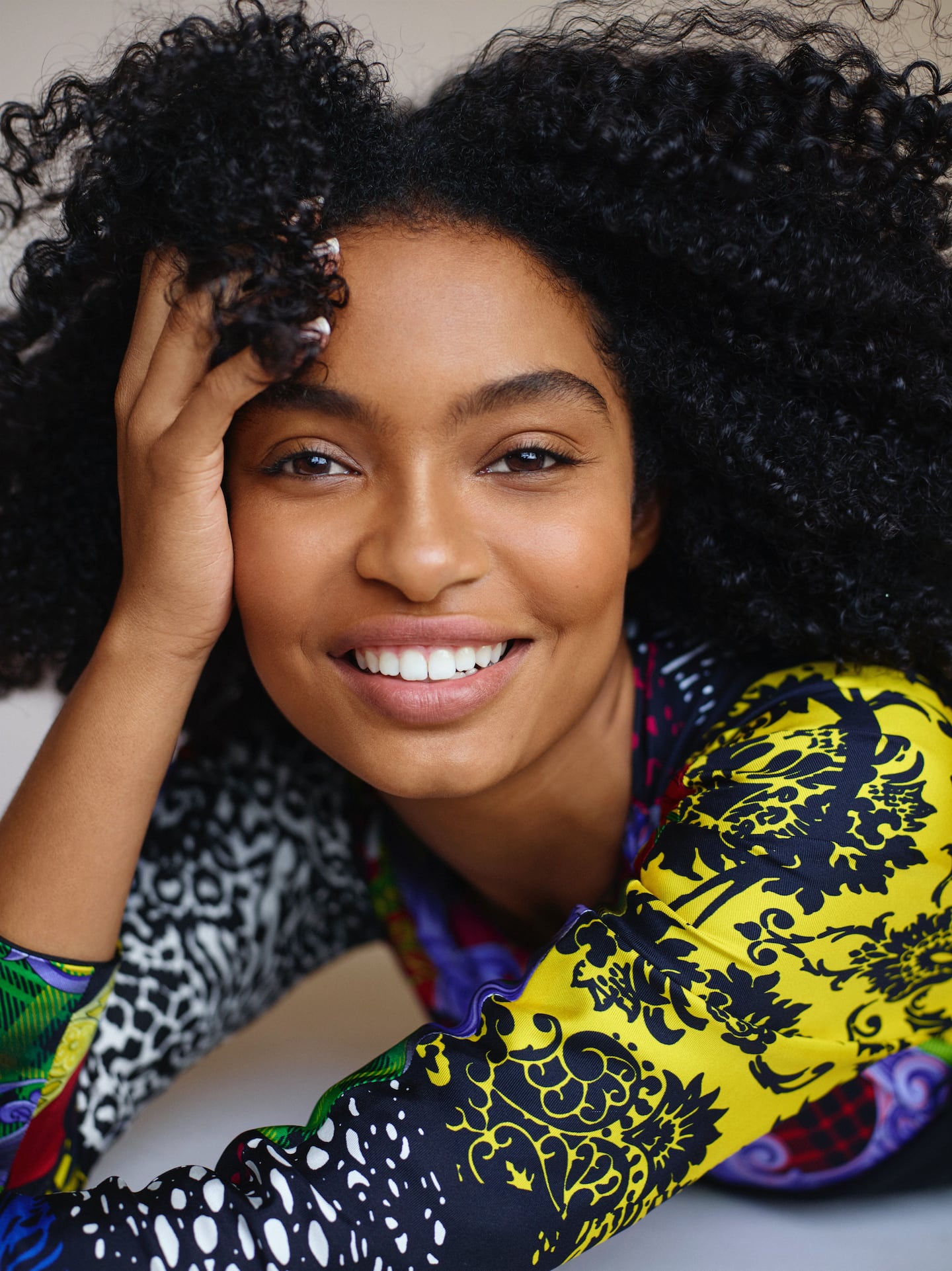
LOS ANGELES, United States — Yara Shahidi could be a future President of the United States. At least if that's what she wants, says admirer Oprah Winfrey, praising the 18-year-old star of not one but two boundary-breaking American television series, "Black-ish" and "Grown-ish."
Sometimes, though, she’s just like any other kid. Sometimes.
Case in point: Shahidi, who has lived in Los Angeles since she was four, has spent plenty of time on North Fairfax Avenue, a strip in West Hollywood that has morphed into what has inelegantly, if accurately, been dubbed "the Rodeo Drive of streetwear," home to Diamond Supply Co., Fourtwofour and, yes, Supreme.
Today, she’s there to eat at Sweet Chick, a chicken-and-waffles joint that happens to be co-owned by her second cousin Nasir Jones, aka Nas, the famous rapper. She’s enjoying the last few moments of summer before she begins her freshman year at Harvard University. (Former first lady Michelle Obama famously wrote her a letter of recommendation.) But don’t expect Shahidi to queue up for the latest drop after she finishes her biscuit, even if she does live in tracksuits and trainers.
ADVERTISEMENT
“I am not a line-stander,” she says, wearing a pink Ignasi Monreal-illustrated #GucciHallucination T-shirt, with a declarative confidence reserved for the charmingly precocious. “You have to view yourself as valuable and your time as valuable.”
You can no longer tell people what they should aspire to be without actually creating a way for them to get there.
However, Shahidi gets why her friends and peers — including Tyler the Creator, who opened a Los Angeles outpost of his label Golf on the street in late 2017 — love a line. “It’s community building, you know? I understand that human need. You’re all there for the same reason,” she says. “It has become a bonding moment. If you are wearing couture, you don’t want anyone else in it. If you are wearing certain shoes, you almost have to give somebody the props for wearing the same thing.”
Fashion marketeers, are you listening? Tune into Yara Shahidi for the 411 on Generation Z — and her honest thoughts on what the future holds for the fashion industry as American culture goes through monumental, often turbulent shifts brought on by technological, demographic and social change.
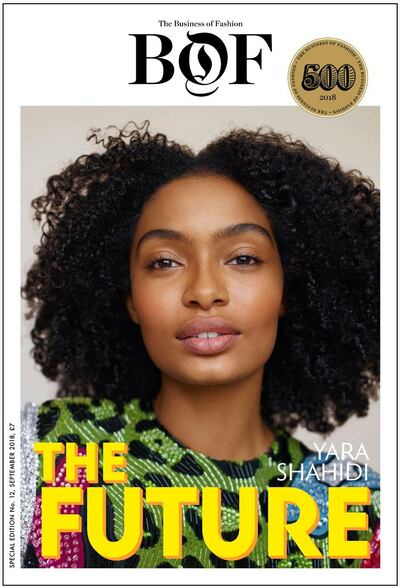
Yara Shahidi | Photo: Thomas Whiteside
With our lesson well underway, here’s a quick backgrounder for the uninitiated: Shahidi — who is part African-American, Native American and Iranian-American — was born in Minneapolis, Minnesota, to Keri Salter Shahidi, a commercial actress with an MBA, and Afshin Shahidi, a director of cinematography. Her 15-year-old brother Sayeed also acts. She calls the craft, which she started doing professionally aged six, “a family affair.” But for Shahidi, the entertainment industry is only one part of her narrative.
“If you look at both of my parents, they both express such duality,” she says, noting that her father studied physics at American University before switching to communications, while her mother’s business degree complemented, never clashed, with her acting ambitions. “There haven’t been many limits on what I can or cannot do. No Plan B, or stable job, or this or that. It’s just kinda like, do what you love and figure out how to monetise it.”
And monetise it she has. While Shahidi was in school full-time when she was shooting commercials and print ads as a child, her career hit an inflection point four years ago, when she was just 14 and landed the role of Zoey Johnson on “Black-ish,” a situational comedy that has remained a top performer for American television network ABC for the last five years.
“Black-ish” radiates mass appeal, yet its nuanced premise — which centres on an upper-middle class black family grappling with assimilation — has earned it critical acclaim for addressing the thorny topic of race. The show has covered issues rarely discussed in broadcast sitcoms, like Donald Trump’s election, the N-word and police brutality. In July 2018, the show’s creator, Kenya Barris, parted ways with ABC citing “creative differences,” according to media reports, including an instance in February when ABC decided not to run an episode of the show that examined race relations in the US in a “pointed fashion.”
ADVERTISEMENT
But before his exit, Barris also developed “Grown-ish,” a 13-episode spin-off documenting Shahidi’s character’s first year at college, which debuted on ABC’s sister cable network, Freeform, in January 2018. Shahidi, who had emerged as “Black-ish’s” breakout star, received glowing reviews. And “Grown-ish” was recently picked up for an expanded 20-episode second season, which will begin filming in September in the midst of her first semester at school.
That’s a lot on its own, even for a highly engaged erudite like Shahidi. But like her parents before her, she has always pursued more than one track. Around the same time as she landed “Black-ish,” she began booking speaking gigs. One of her first major stage moments was a 2015 panel discussion at the Hollywood Bureau Symposium, an annual event hosted by the National Association for the Advancement of Colored People (NAACP), with Pulitzer Prize-winning journalist and Define American founder Jose Antonio Vargas.
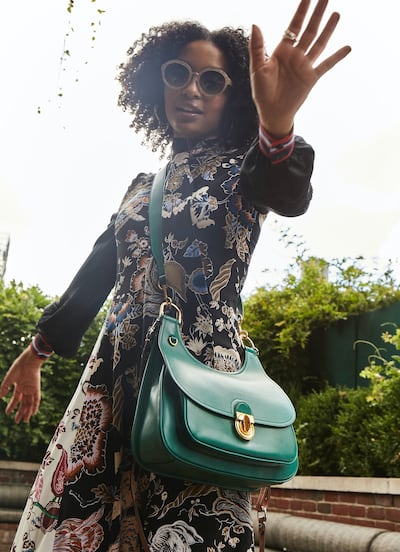
Yara Shahidi by Jen Livingston for Tory Burch
“That’s when I made a mental note that people were interested in what I had to say,” she says. “Even still, I feel like it is a continuous process of realisation, being given the opportunity to interview Harry Belafonte or be on stage with Kamala Harris. It’s like, ‘What in the world is happening right now? How in the world did I get here?’”
There is no doubt Shahidi is making herself heard with a savvy rarely matched by celebrities with decades more experience. As she enters adulthood, which, for now, includes university, two television series, friends, family and the occasional trip to Paris for a couture show, Shahidi has also founded Eighteen x ’18, a non-partisan initiative created in partnership with media company NowThis News that encourages young people to vote. (While 43 percent of 18-to-24 year olds voted in the 2016 presidential election, up from 41.2 percent in 2012, according to the Pew Research Center, they are still under-represented at the polls.)
Over the years, Shahidi has also partnered with The Young Women’s Leadership School — with which she currently hosts “Yara’s Club,” a digital bi-monthly meet-up where young people discuss current events — and DoSomething.Org. Next, she’s launching a podcast with the team behind Pod Save America. This autumn, she’s headed to Cambridge, Massachusetts, where she’s majoring in sociology with a focus on African American studies. Sure, Harvard is arguably the most prestigious university in America — and certainly the most famous — but her decision to study there over the University of California, Berkeley (her second choice) or Stanford, or Yale, or Brown, or any of the eight top-tier schools where she was accepted, was typically thorough and thoughtful.
“No place is perfect, but it’s one of the schools to welcome its first non-white majority out of the Ivys in last year’s admission,” she says. “Plus, the person who set up all the African-American studies departments is at Harvard right now.”
Shahidi's good looks, activist image and 2.7 million Instagram followers have also garnered the attention of major fashion brands and designers, eager to sign her on as an official muse. Thus far, she has worked with American Eagle-owned label Aerie — which captured her and mother Keri for their "Role Model" campaign — and Chanel, who recruited Shahidi to be a US brand ambassador.
ADVERTISEMENT
Fashion is inherently political.
Brands don't simply want to hire Shahidi to star in their campaigns, they also want her to represent them. On stage at the Tory Burch Foundation's inaugural Embrace Ambition Summit in April, she was so captivating that Burch asked her to be a brand ambassador, something she's never done before with a celebrity. "Yara is exceptional," says Burch, who is in the midst of launching her very own, non-partisan voting initiative. "I've gotten to know both her and her mother, Keri, and they both have so much integrity. They will create change."
On the red carpet, with the support of stylist Jason Bolden, she has made colour-packed choices that reflect her attitude. But even those decisions come down to more than aesthetics: Shahidi values her relationships with labels that recognised her talent and potential long before her reach was so broad. "I love my Prada family," she says of the in-house team with whom she and Bolden frequently work. "They're people first. They are our friends."
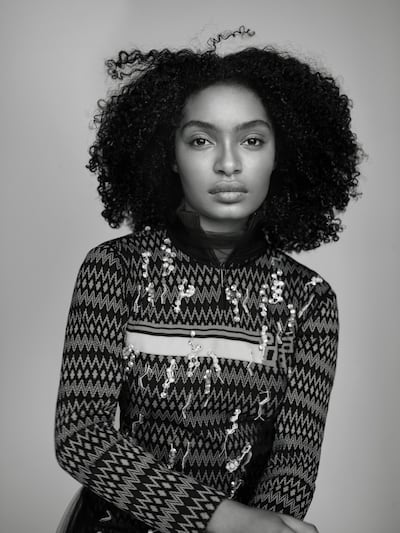
Yara Shahidi by Thomas Whiteside for BoF
“Now that we’re in a space where Yara has the option to wear whatever she wants, the personal relationships are with the people who have their thumb on the pulse, who truly get it and are not just stuck on one ideal look,” says Bolden. “For us, we’ve always let the best dress win.”
At the same time, Shahidi doesn’t need fashion. She can communicate her mission — and she is on a mission — directly to her followers. Through that platform and speaking engagements, she’s able to deliver a message that’s completely in her control. And yet, she sees value — both monetary and cultural — in partnering with brands.
“[These partnerships] allow us to pour into our charitable foundation side. By the time I was 10, I already had my college money set aside. Now I get to have conversations about what charities we are donating to.” What’s more, she says, “fashion is inherently political.”
Keri Shahidi, a calming presence whom Yara still calls “Mommy,” is sitting next to her for the length of our conversation, but not so close that it feels like interference. She interjects just once, floating in and out of the dialogue like a passing breeze. “You bring women of colour into areas that traditionally can be closed,” she says, glancing at the rest of the table, where the star’s “glam squad” — her makeup artist, hairstylist and publicist, all non-white women — are eating lunch following her shoot for the cover of this magazine.
To appreciate that fashion needs spokespeople like Shahidi, just follow the money. She’s part of a generation that wields significant buying power in the US alone, currently accounting for up to $143 billion in direct spending and on track to become the largest group of consumers by 2020, according to digital agency Barkley.
And yet, for the fashion establishment, Gen-Z remains somewhat of a puzzle, thanks to their radically different consumption habits: they binge-watch YouTube, shop via Instagram and are surprisingly frugal. (In a 2016 survey of 400 post-millennials aged 15 to 19 conducted by Lincoln Financial Group, 64 percent had already begun researching financial planning options on their own — or talking about it to others.)
But there’s more to the equation. Just look at all the non-white faces on the newsstands this September — including “Black-ish” co-star Tracee Ellis Ross, who graces the cover of American Elle. Could this be the start of a sea change — or just a fashion trend?
Progression, we know, is often followed by regression. Look at ABC: in 2014, the network was heralded for airing “Black-ish” as well as “Fresh Off the Boat” (starring an Asian cast) and “Cristela” (starring a Latino cast). But since then, the network has been criticised for not bringing more diversity to its programming. (While “Black-ish” and “Fresh Off the Boat” were hits, “Cristela” was cancelled in 2015.)
The tension hit a boiling point with the recent revival of 1980s sitcom “Roseanne,” when star Roseanne Barr made what was called a “reductive” and “belittling” joke on air about “Black-ish” and “Fresh Off the Boat.” (Barr was later fired from the network after making a racist comment regarding former Obama administration senior advisor Valerie Jarrett.)
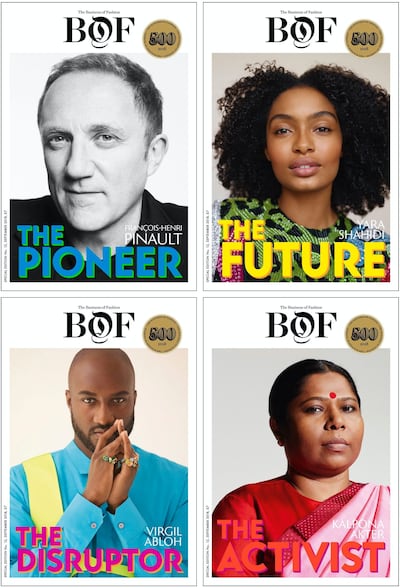
Fashion, Shahidi says, must make more than surface-level changes. "It's the same thing that TV has to do, the same thing the government has to do, which is look behind the scenes," she continues. "We look at the magazines placed in front of us, we look at the ads placed in front of us, the people in those ads and magazines. And that is a very real moment and opportunity to represent so many people. But I think the only way that authentically happens is if you go behind the scenes and you look at the editors, the interns, the people who were given the opportunities… Beyoncé being on the cover of Vogue is absolutely incredible, but I feel like what made double the impact is knowing Tyler Mitchell shot it."
“We have to prove that brown faces are bankable and worth seeing, because ultimately everything is driven by money,” she says. “For brands and magazines, the goal for so long was to be aspirational: marketing the American dream, the white picket fence. But you can no longer tell people what they should aspire to be without actually creating a way for them to get there. It’s now about being inspired. It’s now about being able to see yourself.”
This article appears in BoF's latest special print edition.
To receive a copy of BoF's latest special print edition — including the complete index of BoF 500 members — sign up to BoF Professional before November 2, 2018 and enjoy additional benefits including unlimited access to articles, daily members-only insights and analysis and more with your annual membership.
Related Articles:
[ An Inflection Point for Indian ModelsOpens in new window ]
[ Op-Ed | Why Aren't There More Black Designers?Opens in new window ]
From analysis of the global fashion and beauty industries to career and personal advice, BoF’s founder and CEO, Imran Amed, will be answering your questions on Sunday, February 18, 2024 during London Fashion Week.
The State of Fashion 2024 breaks down the 10 themes that will define the industry in the year ahead.
Imran Amed reviews the most important fashion stories of the year and shares his predictions on what this means for the industry in 2024.
After three days of inspiring talks, guests closed out BoF’s gathering for big thinkers with a black tie gala followed by an intimate performance from Rita Ora — guest starring Billy Porter.